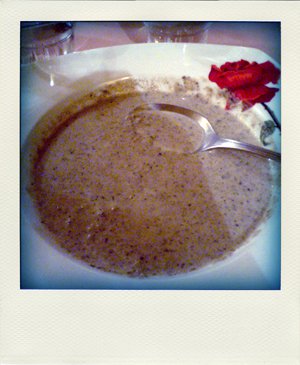
This is part of a series on French idiomatic expressions that relate to food. Read the introductory Edible Idiom post, and browse the list of French idioms featured so far.
This week’s expression is, “Tomber comme un cheveu sur la soupe.”
The literal translation is, “falling like a hair* on soup,” and it means that something or someone appears at an inappropriate or incongruous moment, and is thus completely out of place. (The idiom can also be formed with the verbs arriver, to arrive, or venir, to come, instead of tomber, to fall.)
Interestingly enough, in the context of this expression, the hair found in a bowl of soup causes no disgust. It is merely seen as an anomaly, a thing of no value or consequence that diverts one’s attention from what’s really important: the soup.
Example: “Je n’ai vraiment pas aimé la fin : la scène avec les extraterrestres tombe comme un cheveu sur la soupe.” “I really didn’t like the ending: the scene with the aliens falls like a hair on soup.”
Listen to the idiom and example read aloud:
Comme un cheveu sur la soupe is also the title of a 1957 movie with Louis de Funès (but no aliens).
* In French, there are two words for hair, depending on where it grows: un cheveu is the hair that grows on the head, whereas un poil is the hair that grows on the body. In both cases, the terms refer to an individual hair; if you were to compliment someone on his hair, you would use the plural, les cheveux.




